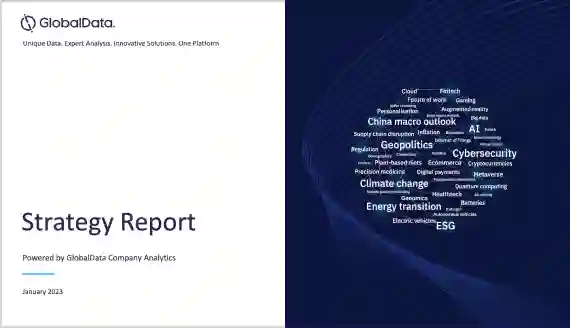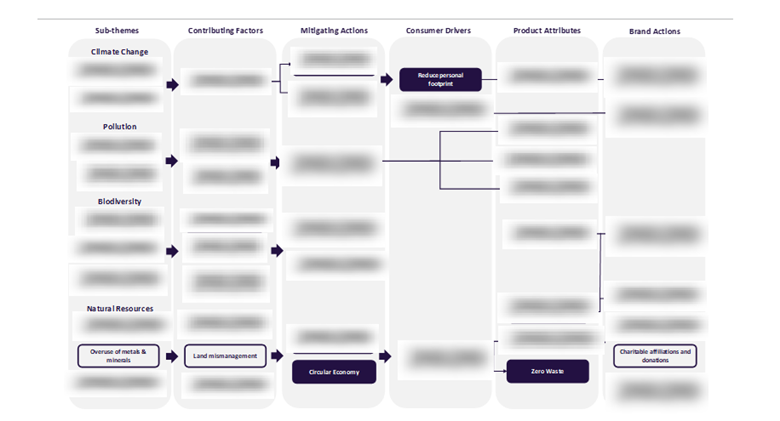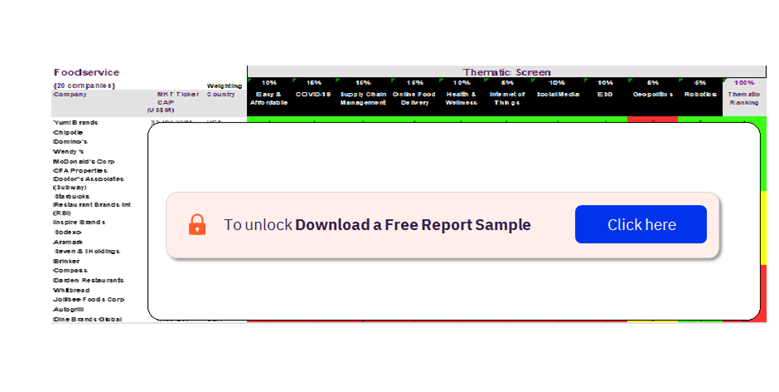Circular Economy in Foodservice – Thematic Intelligence
Powered by ![]()
All the vital news, analysis, and commentary curated by our industry experts.
Circular Economy in Foodservice Theme Analysis Report Overview
The circular economy is a complex and wide-ranging structural concept that advocates an efficient and environmentally friendly approach to consumption. Its implementation corresponds with better economic stability through resource security and new business and employment opportunities from an expanding industrial sector. The circular economy is now a core component of the EU’s 2050 Long-Term Strategy to achieve a climate-neutral Europe and of China’s five-year plans.
The circular economy advocates for the elimination of waste and pollution and the reusing and repurposing of materials and goods where possible throughout the supply chain. This means that materials constantly flow around a ‘closed loop’ system—rather than being used once and then discarded.
Circular Economy in Foodservice: Key Trends
The key trends that are associated with the circular economy theme can be classified into four categories: technology trends, macroeconomic trends, regulatory trends, and industry trends.
- Technology trends – The key technology trends impacting the circular economy theme include blockchain, artificial intelligence (AI), big data, the internet of things (IoT), advanced materials, and social media.
- Macroeconomic trends – The key macroeconomic trends that will shape the circular economy theme are sharing economy, COVID-19, localism, inflation, resource scarcity, supply chain management, and ethical consumerism.
- Regulatory trends – The key regulatory trends impacting the circular economy theme include ban on single-use plastics, the EU circular economy action plan, the EU farm to fork strategy, WRAP: FLAWLESS, and UN SDG target 12.
- Industry trends – Some of the key industry trends impacting the circular economy theme include delivery and takeaway, whole sourcing, portion control, and long-life ingredients.
For more insights on key trends shaping the circular economy theme, download a free report sample
Circular Economy in Foodservice – Industry Analysis
The restaurant industry is an increasingly heavy user of global resources. Despite the boom in online delivery since the pandemic, as countries continue to recover from COVID-19, dine-in will experience the fastest increase in transactions. Therefore, as the primary area for transactions and resources, dine-in will be the priority for investing in circular economy products and service features. However, businesses will have to consider how to meet the rising demand for off-premise services more sustainably.
The circular economy in foodservice industry analysis also covers:
- Case studies
- Timeline
Circular Economy in Foodservice - Value Chain Analysis
GlobalData’s circular economy value chain consists of four segments: climate change, pollution, biodiversity, and natural resources.
Pollution: Broadly speaking, most pollution is caused by industrial and domestic waste products. Land pollutants result from unsustainable agricultural practices (such as the overuse of pesticides and fertilizer), inefficient irrigation, and improper solid waste management (e.g., hazardous chemicals, nuclear waste, and plastics.
Circular Economy Value Chain Analysis
For more insights on the circular economy value chains, download a free report sample
Leading Companies Associated with the Circular Economy Theme
Some of the leading companies associated with the circular economy theme are Again, Amcor, Apeel, Ball, Brambles, Alibaba Group, Aramark, CFA Properties, Chipotle, and Doctor’s Associates.
To know more about the leading companies associated with the circular economy theme, download a free report sample
Foodservice Sector Scorecard
At GlobalData, we use a scorecard approach to predict tomorrow’s leading companies within each sector. Our sector scorecards have three screens: a thematic screen, a valuation screen, and a risk screen. The foodservice sector scorecard has three screens:
- The thematic screen tells us who are the overall leaders in the 10 themes that matter most, based on our thematic engine.
- The valuation screen ranks our universe of companies within a sector based on selected valuation metrics.
- Our risk screen ranks companies within a sector based on overall investment risk.
Foodservice Sector Scorecard – Thematic Screen
To know more about the sector scorecards, download a free report sample
Circular Economy in Foodservice Market Overview
| Report Pages | 45 |
| Regions Covered | Global |
| Key Trends | Technology Trends, Macroeconomic Trends, Regulatory Trends, and Industry Trends |
| Value Chains | Climate Change, Pollution, Biodiversity, and Natural Resources |
| Leading Companies | Again, Amcor, Apeel, Ball, Brambles, Alibaba Group, Aramark, CFA Properties, Chipotle, and Doctor’s Associates |
Key Highlights
- The importance of the circular economy is being fueled by consumer awareness of resource scarcity and a desire to protect the environment.
- The COVID-19 pandemic helped accelerate the transition to a technology-focused economy driven by online sales, remote engagement, and artificial intelligence (AI).
- For foodservice, the key areas of focus will be the reduction of greenhouse gas (GHG) emissions, the recovery and prevention of food waste, the phasing out of single-use packaging, and the implementation of closed-loop packaging.
- With supply chain shortages and inflation continuing to disrupt the industry since the pandemic, it is more important than ever that foodservice operators start transitioning to a circular economy.
Reasons to Buy
- Gain insight into the latest sub-trends around the circular economy.
- Identify how foodservice companies are implementing circular economy techniques in their businesses.
- Discover how new consumer behaviors will influence the circular economy in the years ahead.
Restaurant Brands International
Yum! Brands
Chipotle
Aramark
Sodexo
Whitbread
Panera bread
Brambles
Ball
CFA Properties (Chick-Fil-A)
Loop Industries
Apeel
Mixt Greens
McDonald's
Seven & I Holding (Seven Eleven)
Again
Amcor
Starbucks
Stora Enso
ReTHINK
TerraCycle
IBM
Alibaba Group
FoodLogiQ
Too Good To Go
Winnow
ReFED
Doctor's Associates (Subway)
CauliBox
Nolla
Table of Contents
Frequently asked questions
-
What key technology trends are shaping the circular economy theme in the foodservice industry?
The key technology trends shaping the circular economy theme in the foodservice industry include blockchain, artificial intelligence (AI), big data, the internet of things (IoT), advanced materials, and social media.
-
What key macroeconomic trends are shaping the circular economy theme in the foodservice industry?
The key macroeconomic trends that will shape the circular economy theme in the foodservice industry are sharing economy, COVID-19, localism, inflation, resource scarcity, supply chain management, and ethical consumerism.
-
What key regulatory trends are shaping the circular economy theme in the foodservice industry?
The key regulatory trends shaping the circular economy theme in the foodservice industry include single-use plastics, the EU circular economy action plan, the EU farm to fork strategy, WRAP: FLAWLESS, and UN SDG target 12.
-
What key industry trends are shaping the circular economy theme in the foodservice industry?
Some of the key industry trends shaping the circular economy theme in the foodservice industry include delivery and takeaway, whole sourcing, portion control, and long-life ingredients.
-
What are the components of the circular economy value chain?
GlobalData’s circular economy value chain consists of four segments: climate change, pollution, biodiversity, and natural resources.
-
Which leading companies are associated with the circular economy theme?
Some of the leading companies associated with the circular economy theme are Again, Amcor, Apeel, Ball, Brambles, Alibaba Group, Aramark, CFA Properties, Chipotle, and Doctor’s Associates.
Get in touch to find out about multi-purchase discounts
reportstore@globaldata.com
Tel +44 20 7947 2745
Every customer’s requirement is unique. With over 220,000 construction projects tracked, we can create a tailored dataset for you based on the types of projects you are looking for. Please get in touch with your specific requirements and we can send you a quote.
Related reports
View more Foodservice reports












